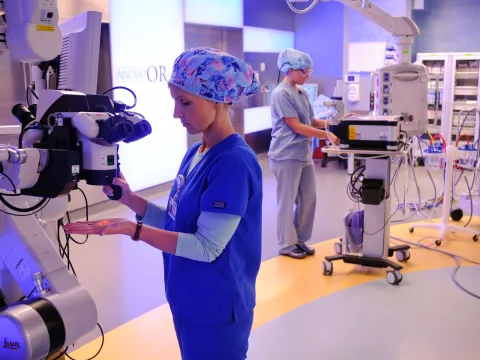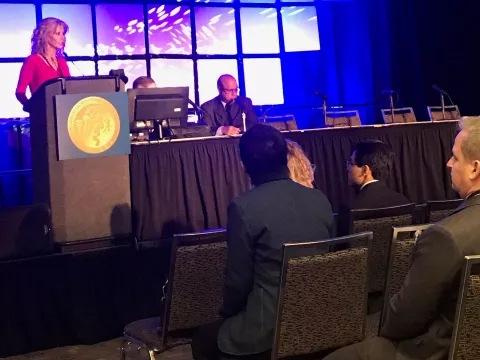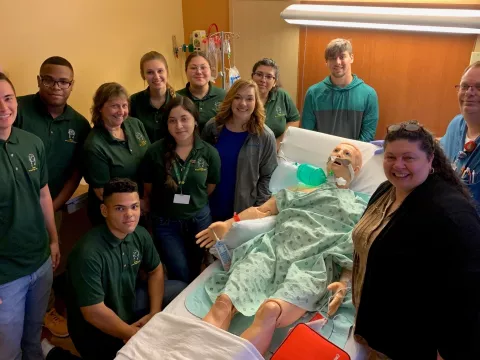- AdventHealth Digestive Health Institute

On 23-27 April 2012, I was fortunate to be invited as faculty to the XIII World Congress of Endoscopic Surgery in Puerto Vallarta, Mexico. It was the first time I attended this conference. I was impressed not only by the content of the program but also the number of surgeons attending this conference. I learned that every other year this conference is scheduled in a different city in the world. For instance, the next conference is going to be in Paris France, nice.
Leaders from around the world lectured at this event. It was very interesting to learn how medicine is being practiced in different parts of the world. For instance, I learned that in Brazil patients pay for, not only their operation, but also the surgical instruments used during their operation. If a surgeon wants to offer her or his patients a new state-of-the-art operation, the patients will have to assume the entire cost of the instruments and operation, not the hospital.
In the conference, I was asked to present our experience with single incision laparoscopic gallbladder removal without general anesthesia. It was interesting to see that majority of surgeons were reluctant to offer this operation without general anesthesia. Although this operation with epidural, local anesthesia, is as safe and has additional benefits to general anesthesia, surgeons are not embracing it yet. I believe that as we continue to publish our excellent results with this surgical approach, more patients are going to demand it and surgeons will have to meet their demand. Surgeons maybe reluctant to undertake operations without general anesthesia for various reasons. Having a patient awake in the operating room requires a different level of alertness and behavior adjustment from the operating room staff. It is very different when a patient is awake versus asleep. For instance, the operating room team has to watch their language more carefully when the patient is awake, surgeons need to be present in the operating room as soon as the patient arrives to the operating room because they do not need to be induced for general anesthesia and are immediately ready to be operated upon, and the communication between the surgeon and the anesthesiologist has to be optimal. In general, an awake patient is more challenging than an asleep patient, not to mention that the operation itself is not easier with epidural but instead requires an experienced laparoscopic surgeon to undertake this surgical approach successfully. For all of the above mentioned reasons, I believe it will take a little time for this approach to be widely adopted. Until then patients can come to see my partner and I at our Florida Hospital HPB and Foregut Minimally Invasive Laparoscopic and Robotic Practice in Tampa on Bruce B Downs and Fletcher for surgeries without general anesthesia.
Recent News

Dr. Sharona B. Ross, MD, FACS Is Meritoriously Named A ‘Patient Preferred Surgeon’ Representing The State Of Florida For 2020
For her dedication and excellence in patient care, Patient Preferred Physicians and Practitioners proudly named Dr. Sharona B. Ross, MD, FACS, a Patient Preferred Surgeon for upper gastrointestinal...

Two Digestive Health Institute Hepatopancreatobiliary (HPB) Surgeons Present At American College Of Surgeons’ Clinical Congress 2019
AdventHealth Digestive Health Institute (DHI) surgeons Sharona Ross, MD, FACS, and Iswanto Sucandy, MD, FACS, gave presentations at the Clinical Congress 2019 of the American College of Surgeons (ACS)...

Dr. Alexander Rosemurgy Makes The Case For Expanding Access To Robotic Surgery
Alexander Rosemurgy, MD, FACS, an advanced foregut and HPB surgeon at AdventHealth Digestive Health Institute (DHI), spoke at the 4th annual Intuitive 360 conference.

World-Class Surgical Treatment Options For Colon And Rectal Cancer With Metastasis To The Liver
The experts at AdventHealth Digestive Health Institute (DHI) are at the forefront in the adoption and application of robotic surgery for conditions of the digestive system. The complexity of advanced...

World-Class Surgical Treatment Options For Colon And Rectal Cancer With Metastasis To The Liver
According to the American Cancer Society, metastatic liver cancer, or cancer that has spread to the liver from the part of the body where it originated, is the most common form of liver cancer, with...

Robotic Whipple Results In Faster Recoveries And Better Outcomes For Patients
Sharona Ross, MD, FACS, advanced HPB surgeon with AdventHealth Tampa gave a podium presentation today at the 2019 Society of Gastrointestinal and Endoscopic Surgery (SAGES) meeting in Baltimore, MD...

Dr. Sharona Ross Video Presentation Accepted Into 13th IHPBA World Congress
The International Hepato-Pancreato-Biliary Association will be hosting its 13thIHPBA World Congress in Geneva, Switzerland from Tuesday, September 4th, 2018 to Friday, September 7th, 2018.

Florida Hospital Tampa Participates In Lustgarten Foundation Fundraiser
This past weekend, our team participated in the Lustgarten Foundation Pancreatic Cancer Research Walk in Tampa Bay.

Dr. Sharona Ross Recognized At Women In Surgery Career Symposium
The Women in Surgery Career Symposium took place last weekend, February 16ththrough 18th, at the Wyndham Grand Hotel in Clearwater Beach.

Dr. Ross Attends Southeastern Surgical Congress Robotics Course As Faculty
The Southeastern Surgical Congress (SESC) was recently held at the CAMLS Simulations Center in Tampa, Florida, bringing together some of the greatest minds in surgical fields from around the country.

American College Of Surgeons Conference
Dr. Sharona Ross of the AdventHealth Digestive Health Institute was invited to present at the American College of Surgeons conference in San Diego this week.

Best Program Features Doctors Ross, Rosemurgy and Sucandy As Teachers
The B.E.S.T. Academy is a four-week training, mentoring, and educational program for up-and-coming students.
